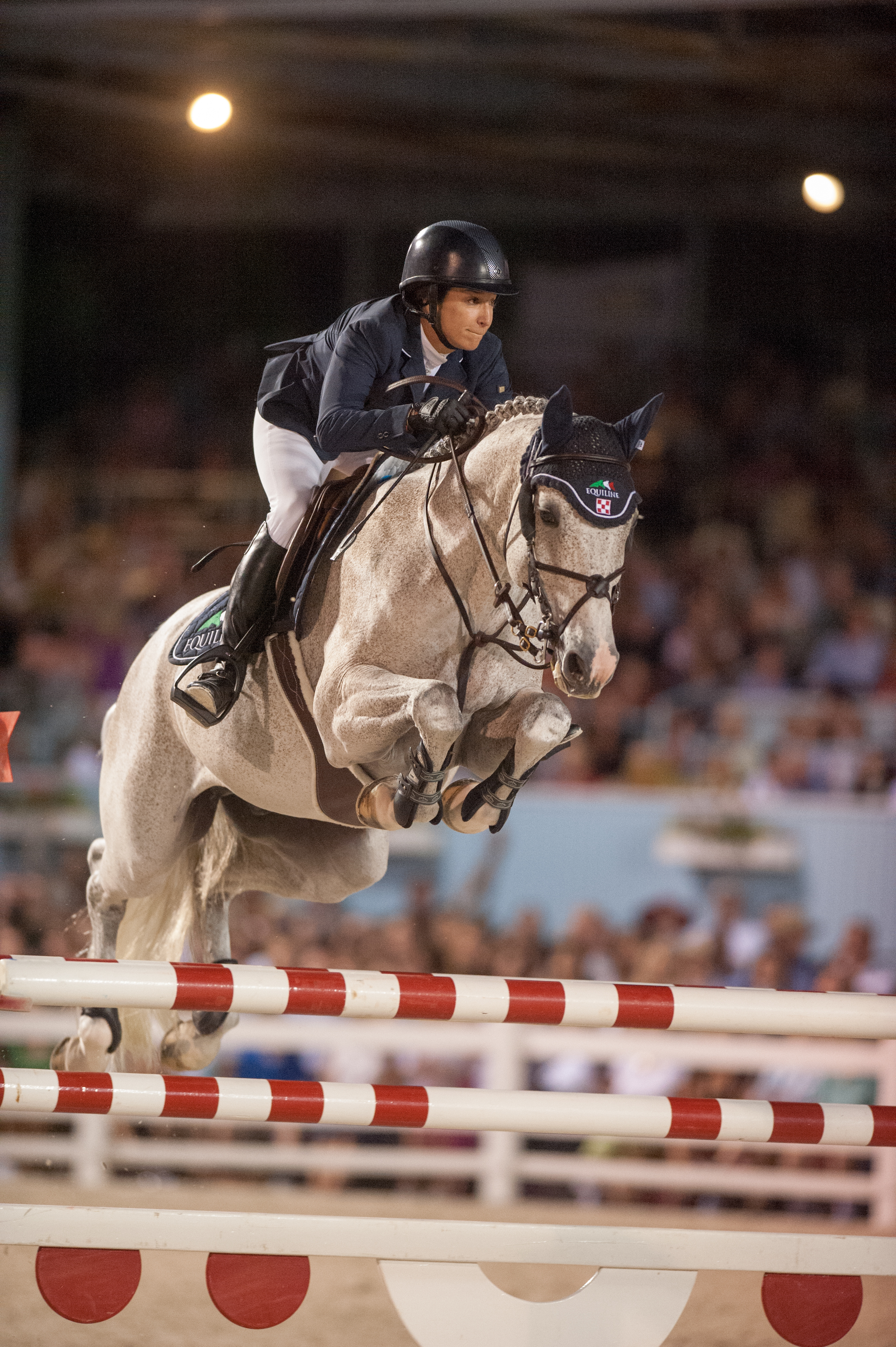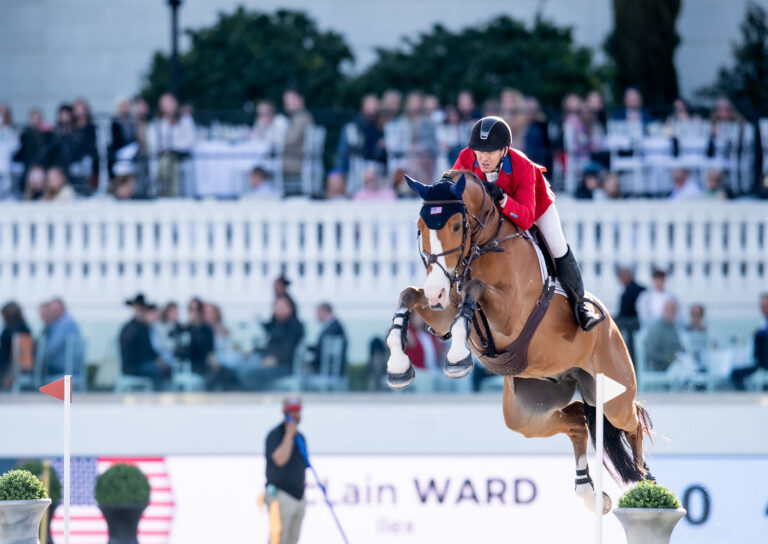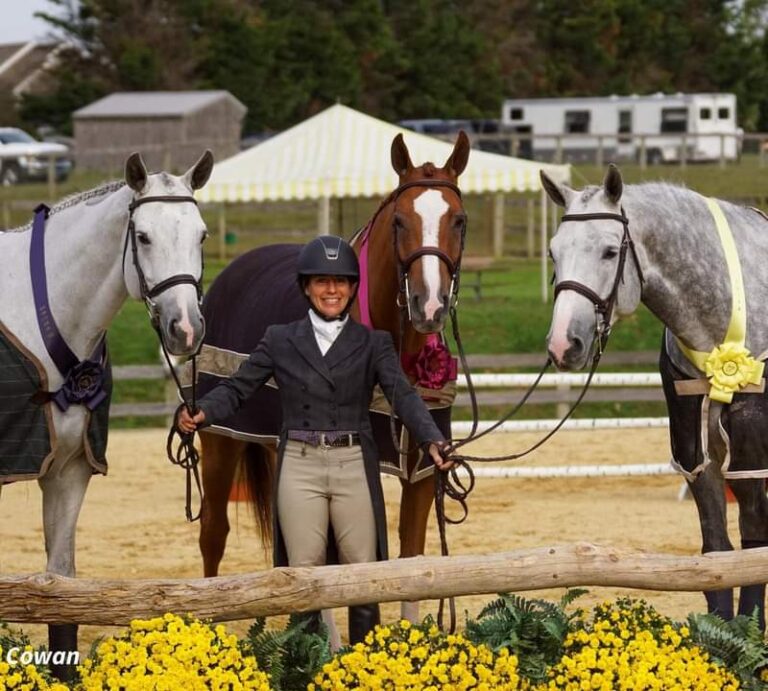
It was inevitable that Laura Kraut would have a life with horses.“From the youngest age I can remember, I loved horses and ponies,” Laura explained. “There was never a day that I wasn’t thinking about them, feeding them, drawing them, riding or playing with them.”
Laura had a successful junior career with trainers Kathy Paxon and Ann Keenan in Georgia. As a professional in her 20s, Laura rode both hunters and jumpers until 2000, when her friend and mentor Katie Prudent convinced her to gain experience on the European show-jumping circuit. That year, Laura won her first Olympic trial at Gladstone and the $100,000 USET Open Jumper Championship. Realizing that “little by little the sport was changing, and it became difficult to do both hunters and jumpers really well,” Laura decided to focus on a show-jumping career.
She represented the U.S. at the Beijing Olympics in 2008, winning a gold medal on her talented Cedric. She was a member of the silver-medal WEG team at Aachen, Germany, in 2006. She’s ridden in eight World Cup Finals and on 71 Nations Cup teams, including the 2017 Longines FEI Nations Cup™ Final in Barcelona, Spain. Laura has won over 100 grand prix classes during an international career spanning more than three decades.
Laura lives in Henley-in-Arden, England, while in Europe and Wellington, Florida, during the winter season with her partner, international show jumper Nick Skelton, and her 19-year-old son, Bobby. Her sister, Mary Elizabeth Kent, works side by side with Laura in managing the barn and the business.
Practical Horseman: What are some words that describe what show jumping means to you?
Laura Kraut: Competitiveness. Thrill. Joy. Pride.
PH: Have those feelings changed for you over the years?
LK: For sure those feelings have changed. The anxiety and the nervousness—the apprehension that I felt when I was first jumping against the best riders in the world—go away as your confidence increases. But I still feel the same excitement about going in the jump-off at Aachen or any of those top shows. It’s the same thrill of being at a show the first day, getting ready to compete, watching other horses and going in the ring.
PH: When did you realize you would be successful?
LK: I never worried about being successful because in this sport if you base success on your victories you will be disappointed. The win ratio is very low in the jumpers. You are lucky to win one in 20 classes at the upper level. So you base your success on your horses, their progress and your own feeling of how you are riding.
PH: To what do you attribute your success?
LK: Determination. I never doubted where I was going. I wasn’t sure when I was going to get there and I wasn’t being cocky or arrogant. But it just never entered my mind that I wouldn’t do this.
Also, I’ve never ever been one to have a temper, particularly with the horses. I think that is very important when competing and training young horses. You have to stay very level. I don’t have a lot of big highs, no lows. I like to stay somewhere in the middle. When I win the big class, I am happy and excited, not over the moon. When I have a bad round, I don’t go home and bury my head in the sand. I just think what I am going to do to fix it.
PH: What is the most important thing you have learned about yourself over the years?
LK: Probably that I have the ability to phase out all that is going on around me. When something important is happening, like a Nations Cup or the Olympics, I don’t get horrifically nervous. For whatever reason, I am able to focus and go in and get the job done.
PH: What was the hardest part of this sport for you?
LK: I’ve always enjoyed people, but I was shy when I was young. One of the hard things to learn to do is go sell yourself, be out there, be tough. As a woman in this sport you are dealing with a lot of men, especially in Europe. I had to overcome my basic shyness. I am one of those people who would rather not cause a conflict. I would rather have the problem than someone else. But in the end, that is not very useful in business. I have had to learn to be a bit of a tougher person. I still work on that because it doesn’t come naturally to me.
PH: What is your fitness routine?
LK: In Florida, I work out with a personal trainer three days a week. In Europe, I work out in the gym pretty much every day. The schedule in Europe is less grueling, as there are fewer hours that I am at the show. I run, I do elliptical, I bike, do weights, everything. I like it even though there are times when I have to make myself do it. As you get older, it becomes more and more difficult to bounce back if you have a fall. Your body doesn’t react the same. So if you stay good and fit, hopefully the wisdom you get with age outrides the deterioration in your body!

PH: When you discovered Cedric in Belgium in 2005, why did you decide to buy him?
LK: Honestly, I didn’t know he would be as special as he was. I loved the way he jumped. I got on him and I didn’t do more than 20 jumps. There was something about him I liked and I said I would buy him. I didn’t know he would go to the Olympics.
Cedric was a very spooky, very scared horse. He had a huge heart and could be very brave, but sometimes his bravery would fall by the wayside. He was afraid of walls and water. He had a lot of issues. I wasn’t sure he would overcome that to become a top international horse and yet he did. He eventually started to settle in and became about 85 percent dependable. It took eight years. Even up to the end, when he was 19, he was still tricky to ride.
PH: Cedric retired from competition last year. Do you still
ride him?
LK: Absolutely not! He’s enjoying his life in the field with his friends, including Lauren Hough’s Quick Study.

PH: What makes you a good leader in this industry?
LK: I am not afraid to speak my mind. If I really believe in something, I say it and people know I actually mean it. When I teach the kids, I try to always put a positive light on it, but I am going to tell them what I think they’ve done wrong. Most of the students appreciate that.
PH: What one thing would you change about yourself?
LK: I would tell myself to not worry so much. I am a big worrier, but I’m getting better. I used to worry about things that I had no control over. Now I try to worry less. I worry about what I can do something about and not all the rest.
PH: Did becoming a mother impact your career?
LK: It definitely changed me because until then all I had ever done is eat, sleep and breathe horses. Then suddenly I had something else to put my mind on. Ironically, about the time Bobby was born and then turning 1, that was when my career made a pivotal turn. Was that a coincidence? I don’t remember a day when I had a revelation that having my son had helped me, but through the years, as he was growing up, we were juggling having a son, his going to school and me going to Europe. He was obviously my number one priority and maybe that helped me be a bit calmer and more grounded about the competition.
I do think he changed my life and always for the better.
PH: How does it feel to win at the top of this sport?
LK: It’s always fun. And there are moments of pure elation: You had to go in and set a blistering time to beat someone, and you pull it off. Or it’s your last chance to make a team, and you go in and get it done. It’s winning a Nations Cup, being part of a team and all pulling together. It’s why we all do this sport.
PH: How tough is it to lose?
LK: If you are going to be in this sport, you need to be better at losing than winning. Sometimes you want to kick yourself for about an hour. But you just need to think: “I should have done this. Next time I am going to do that.” I try to put losing in the closet as quickly as possible.
PH: How do you continue to learn?
LK: I am 52, I have ridden every day from the time I was 5 or 6 years old. I’ve been riding for more than 45 years. On occasion, trainers Katie and Henry Prudent come and give me a burst of energy and new ideas. A new horse inspires you. I find there are lots of reasons to stay excited.
I am also fortunate to be based part of the year in Europe. I am surrounded by a lot of different riders all the time. I am always studying and watching. A lot of the riders at the top level are very happy to exchange ideas. It’s kind of a big family of riders. Everyone is always learning and listening. There is tremendous camaraderie among the riders. In that way it keeps it fresh.
PH: What have you learned in your career that you would share with young professionals?
LK: I knew from the beginning what I was doing for the rest of my life. I’m part of a small percentage of people who can say that. So I believe that if you know what you want, if you are lucky enough to have a passion, then work as hard as you can and don’t give up.
PH: Is there a quote or saying that particularly speaks to you?
LK: Nick Skelton has had many victories and many losses. He has been in this industry for so long and has had the same ups and downs we all have. When I have had a bad day, we talk about it for a minute. And then he will just say, “Never mind.” And that puts it back to the importance that the event was supposed to have. That is Nick’s approach and I try to live by it.
This article was originally published in the June 2018 issue of Practical Horseman.











